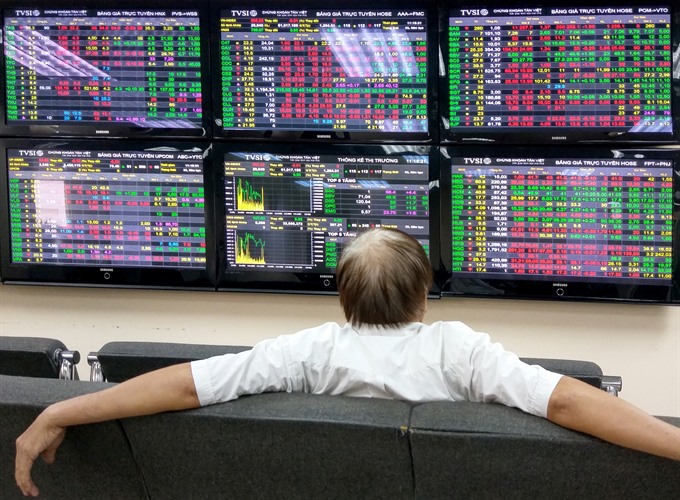The VN-Index has little chance of recovery this week as short- and medium-term indicators are poor, with low liquidity and strong market fluctuations, triggered by investors’ cautiousness about macroeconomic instability.

The VN-Index has little chance of recovery this week as short- and medium-term indicators are poor, with low liquidity and strong market fluctuations, triggered by investors’ cautiousness about macroeconomic instability.
The market suffered a week of losses with a downtrend in five consecutive sessions last week.
The benchmark VN-Index on the Ho Chi Minh Stock Exchange (HOSE) fell 1.03 per cent on Friday to finish last week at 900.82 points, a weekly loss of 6 per cent.
The index was down 8.4 per cent compared with the beginning of this year.
The minor HNX Index on the Ha Noi Stock Exchange lost 1.27 per cent on the same day to end the week at 101.79 points, a weekly decline of 5.83 per cent.
It had fallen 12.8 per cent compared with the beginning of this year.
An average of more than 209.7 million shares were traded in each of the five sessions last week, worth VND4.3 trillion (US$184 million).
The trading figures were up 11.8 per cent in volume and 4.8 per cent in value compared to the previous week.
According to Nguyen Nhat Cuong, deputy director of the analysis division at the Vietinbank Securities Co, the recovery opportunities for the VN-Index this week are weak as market indicators perform badly when investors lack confidence.
“Every recovery effort of the indexes is likely to fail to maintain long and stable because the Vietnamese stock market is in the status of ‘immune’ to positive information but ‘extremely sensitive’ to negative information,” Cuong told tinnhanhchungkhoan.vn
According to Bao Viet Securities Company (BVSC), as of Wednesday, business results for the first nine months of 449 companies listed on the HSX, HNX, and UPCOM have been released, of which 388 companies, or 86 per cent, reported profits.
These 449 firms recorded VND70.3 trillion of profit after tax, up 31.1 per cent from VND56.6 trillion in the same period of 2017.
Notably, 69 of 449 companies have fulfilled their yearly targets, including PetroVietnam Gas JSC (GAS) (138.1 per cent), seafood processor Vinh Hoan Corporation (VHC) (167.1 per cent), PetroVietnam Fertiliser & Chemicals Corporation (DPM) (148.4 per cent) and Phuoc Hoa Rubber Joint Stock Company (PHR) (121.9 per cent).
However, the impact of positive results on investors’ sentiment was insignificant as these results were released during bearish sessions and have already been reflected in recent stock prices.
According to Cuong, in the worst scenario, the VN-Index is likely to keep fluctuating in the 880-900 point range, with overall market liquidity maintaining an average level.
Ngo Quoc Hung, an analyst at MB Securities Company, said last week, the financial storm continued to sweep through global stock markets. While the Asian stock market has fallen into “bear market” status, major indicators in Wall Street also slipped.
The S&P 500 ended at its lowest level since early May last Friday. The benchmark index fell more than 10 per cent from its September 20 record closing high. The Nasdaq registered its biggest weekly drop since March 23 after confirming a correction earlier in the week.
“In this context, it is apparent the Vietnamese stock market would strongly be affected,” Hung said.
“In the context that domestic supportive information is ignored and external influences are increasing, the market will probably undergo a short-term downward trend.”
For next week, in the most optimistic scenario, the market may rebound a little thanks to bottom purchasing power. The more likely scenario is a market fall to the 860 - 884 point range.
Although banks reported good business results for the third quarter, many banks recorded lower profits compared to the same period last year, said Nguyen Hong Khanh, head of market analysis at Viet Nam International Securities Joint Stock Company (VIS).
When the market falls, investors are forced to restructure their portfolios, selling stocks with poor expectations, meaning many stocks have reported good business results but still sold strongly.
“Although there are some concerns about the political situation and global trade war, the reaction of the market seems to be excessive. In the current context, investors can choose stocks that have stable business growth and less exposure to external factors such as trade and exchange rates,” Khanh said, adding that many stocks in the garment, construction, real estate and retail sectors have maintained good growth. — VNS





